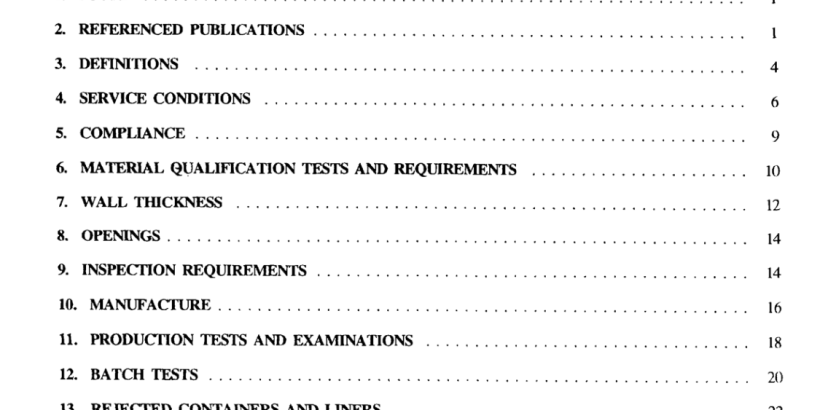ANSI CSA NGV2-2000 pdf download.BASIC REQUIREMENTS FOR COMPRESSED NATURAL GAS VEHICLE (NGV) FUEL CONTAINERS
4.1.4 Periodic InService Inspections.
Any requirements for periodic requalification by inspection or testing during the service life shall be specified by the container designer on the basis of use under service conditions specified herein, Each container shall be visually inspected at least every 36 months, or at the time of any re-installation, for extemai damage and deterioration Unless otherwise specified by the vehicle or container manufacturer, visuai periodic inspeaions of the exposed container surface (a fk the removal of stone shields and other removable protective covers, as necessary) shall be performed. The inspection shall be performed by a qualified container inspector in accordance with (1) the manufacturer’s recommendations and (2) the inspection procedures provided in CGA pamphiet C-6.4. ‘The container shall not be uninstalled unless required by the quaMeci container inspector on the basis of visual damage or unies dekriomtion is noted on the exposed container surface. ínspecûons shall be documented by the inspector and the documentation shall be made available to the authority having jurisdiction upon request. Aitmwively, containa may be inspected as instailed using a nondestructive test method approved by the container manufadma. Con- without labels containing mandatuy information, or with labels coníaining mandatory hiormaiion which is iiiegible in any way, shall be removed from service. If the container can be positively identified by manufacturer and Senal numk, a replacement label supplied by the manufacturer may be applied to the container, and it may remain in service.
6.23 Sulfide Stress Cracking Resistance for Steels.
The ultimate tensile strength of the steel from a finished container shall not exceed 1200 MPa (175,000 psi). If the upper limit of the ultimate tensile strength exceeds 950 MPa (138,000 psi), the steel shall be tested in accordance with the procedures desaribed in Method A – NACE Standard Tensile Test of NACE Standard TM0177-96, except as noted in this section. Tests shall be conducted on tensile specimens with a gauge diameter of 3.81 mm (0.150 in) machined from the wall of a finished container or liner. The specimens shall be placed under a constant tensile load equal to 60 percent of the specified minimum yield strength of the steel, immersed in a solution of distilled water buffered with 0.5 percent (wt/wt) sodium acetate trihydrate and adjusted to an initial pH of 4.0 using acetic acid. The solution shall be continuously saturated at room temperature and pressure with 0.414 kPa (0.06 psia) hydrogen sulfide (balance nitrogen). Three specimens shall be tested and none shall fail within the 144 hour duration of the test. Specimens that fail outside the gauge length are considered invalid tests.
6.6 Nonmetallic Liners (Type NGV2-4).
The nonmetallic liner material shall be compatible with the service conditions specified in Section 4. The softening temperature shall be at least 909C (194F), and the melting temperature at least 100°C (212°F), when tested in accordance with the method described in ISO 306, Determination of Vicat Softening Temperature, or using an alternative method. The tensile yield strength and ultimate elongation shall be determined in accordance with ASTM D638, Standard Test Method for Tensile Properties of Plastics. Tensile or impact testing shall be conducted on samples of the nonmetallic liner material to demonstrate that the material fails in a ductile, rather than brtle, mode at temperatures down to and including -50°C (-58F).
9.1 Inspection During Qualification.
All design qualification tests shall either be conducted or witnessed by a representative of a nationally recognized testing agency or an independent inspection agency. The nationally recognized testing agency shall be accredited [e.g., by the American National Standards Institute (ANSI), or the Standards Council of Canada (SCC)]. The independent inspection agency shall comply with the requirements of section 17.2(a) [Independent Inspection (Option 2)]. Chemical analysis and tests as specified shall be made within the United States or Canada unless otherwise approved in witing by the approving agency σr independent agency.ANSI CSA NGV2-2000 pdf download
